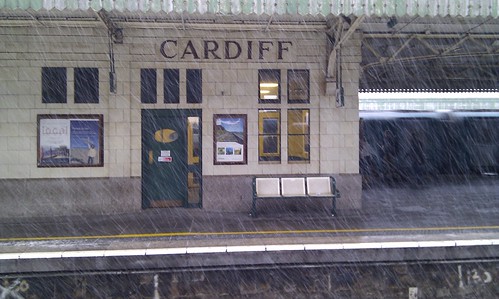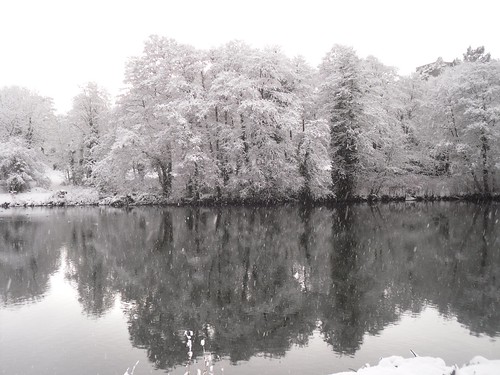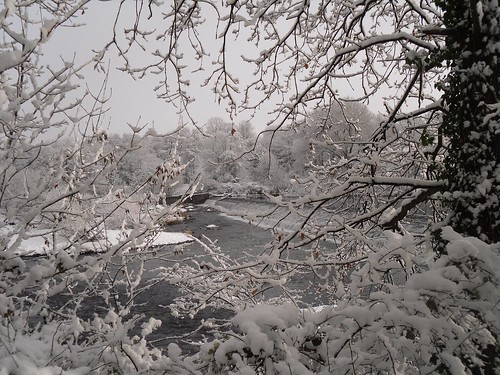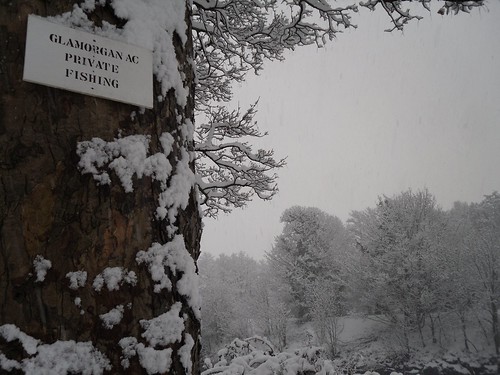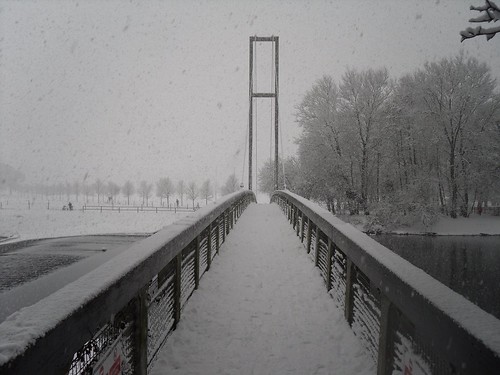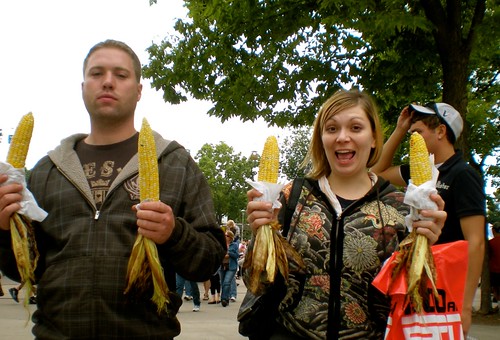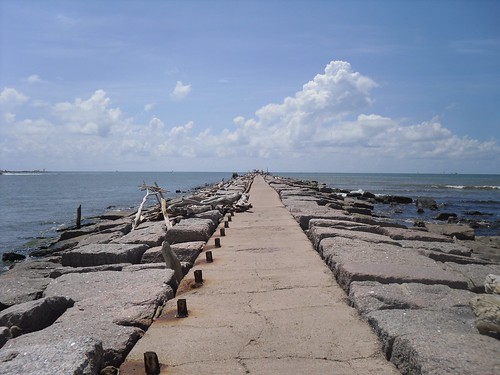My dearest Emma,
Last time I wrote to you it was a few days after Thanksgiving, aboard a First Great Western train speeding westward from Britain's ancient capital. Now, two days after Christmas, I write to you again from a train: carriage G of the 11:15 First Great Western Service from London Paddington to Cardiff Central. I am travelling first class, but seeking to consume enough complimentary tea, croissants, bottled water and biscuits that it effectively reduces the fare to standard class.
And as with the last time I wrote, I have spent the past few days visiting Jen and Dave, my family on this island of rain. I'm sure I've told you ad nauseam, Emma, how much I love them. Listening each morning to Minnesota Public Radio, filling their tiny but lovely flat with the smell of chai tea. On the shelves, books of philosophy and psychology. And tucked among the fiction of David Sedaris, Salman Rushdie and Steinbeck -- perhaps ironically -- is my own volume, Cwrw Am Ddim. That is what family do, isn't it, Emma? Proudly display one's works, even when unread.
I like to imagine Dave and Jen as removed from time. They have that look about them. Jen, especially, possess the classic beauty one sees when digging through yellowed photos of family members never met. Looking at her, one can almost hear a faraway offspring, many years into the future, pointing proudly at her image and saying: "Look at my great-great grandmother! Wasn't she beautiful?" She was, Emma. She is. I can personally attest. And that future child's great-great grandfather, with his indefatigable love of pun, possesses all the warmth and humour such beauty deserves.
Some part of me likes to imagine, then, that Jen and Dave are relatives who were somehow transported from the early decades of the 20th century. A great-great aunt and uncle. Unflappable, they have chosen to simply adopt to their modern surroundings rather than raise a fuss. They aren't these things, of course. Jen is just a girl I knew in high school and Dave a bloke from Canada. That makes them no less close to me, however. And they were good company to have in this season when ghosts of the past sometimes rattle their chains too loudly.
Jen and Dave are so close that I possess a set of keys to their flat. In that way, I have my own little home in London and, as such, can make a weak claim to feeling a sense of belonging in that ancient, unstoppable city. But it is still odd I should feel any strong connection to London, since I have never lived there. If you were to combine all my visits, Emma, I doubt the sum of all days would be even two months. But I have that connection to place that comes from connection to people in that place. Similar to the way I feel at home in Dublin.
I'm always slightly amused when my perceived sense of belonging is confronted by an actual lack of knowledge. I'll be walking along thinking: "I know this city. I am this city. This city is me. We are one. Every corner is... wait. Where the hell am I? Did I already walk down this street? Which way is north? Which way am I facing now? OK, I'll just walk in this direction until I reach a Starbucks, Costa or Pret-a-Manger. I hope it's a Pret..."
I am well-acquainted with the chain coffee shops of Europe's capitals, Emma.
Anyhoo, Christmas was lovely. I was poorly, with a sore throat and headache, through the whole of it but that didn't affect my mood. We ate exceedingly, watched films, talked and laughed and, in my case, cried. Once. I was very tired, Emma.
Adding to the mix was another American refugee, Alice, a sheep rancher from Northern California. She played banjo and told stories in that weird California way of not offering any background information about the players in her narrative. So, "Dan" would appear without any explanation of who or what he is. Instead of "my friend Dan," or "Dan my boss," or "Dan the guy who killed my father and whom I have spent these past 10 years travelling the Earth in search of in order to exact my revenge via the cold justice of a steel blade," it's just "Dan." Through the course of the story one may figure out who Dan is via context clues, but often that is not the case. I found Alice's blatant disregard of oral storytelling tradition to be rather off-putting, Emma. But she was otherwise lovely, and one can't really leverage too much criticism against a girl who plays the banjo.
I am sad to have Christmas come and gone so quickly. The gentle snow-covered hills of England blur past my window and soon -- far too soon -- I will be back in Cardiff. I'm not ready to go back; if not simply because there is not much to go back to. I suppose the biggest news from Cardiff since I last wrote is that there is no news. I am still doing nothing of worth; I am still poor; I am still looking for work; I am still relying on an allowance from my father to get by, as if some Victorian dandy.
Actually, phrasing it that way makes things sound so much more awesome. Perhaps I need not lament that I am unemployed, broke and directionless. I simply need to rethink my branding: European cafes! Living off Father! Keeping the company of burlesque dancers and stage performers! Sharing a house with a gymnast! Give me absinthe and paint me gold! I am a Bright Young Thing!
Yes, now that I think about it, Emma, things are glorious here. Though, I do still wish I could find full-time employment. Sadly, that is far easier desired than achieved in the Old City of New; jobs in Cardiff are few and far between. That is true of the whole of Britain, actually. And the scarcity of available opportunities is compounded by the fact that job postings are so cryptic. Positions are given frustratingly ambiguous names like "coordinator," which offer little insight into what a person would actually do. I generally apply for the position, anyway. So far, I have only heard back from one would-be employer, who offered rejection via form letter.
Regardless of employment status, I find myself eager to make some sort of major life shift in the new year, Emma. I'm not sure what I mean by that, except to say that I am unhappy with the man I am. I am not who I want to be. I am not who I am capable of being -- a reality that even friends are beginning to point out.
I have been in the grips of an apathy-induced writer's block since September, Emma, and I can feel it eating away at my insides. Not creating makes me ill. But I'm not sure what to do. I can't seem to find anything within me -- any desire or reason to connect. At night I will promise myself that tomorrow will be better, but in the morning I fail to see a point in getting out of bed. I am often too indifferent to daydream.
I don't want to be this way, Emma. I want to change. Maybe I will. Tomorrow.
There is at least one change coming in the new year that I have already set into place. I'll be moving out of my house. Primarily I'm doing that because I can't afford to stay. I know I've told you countless times how awesome my neighbours are, Emma, so I'm sure you can imagine how heartbroken I am about it. But there is no real money coming in, nothing with which to pay rent. I try to look at it positively. Perhaps it will kick me out of my malaise. That's hard for me to really believe, but telling myself the truth is just so depressing.
I hope all is well on your end. Say hello to your family for me. Please send nude photos.
I remain your humble servant,
Chris
Last time I wrote to you it was a few days after Thanksgiving, aboard a First Great Western train speeding westward from Britain's ancient capital. Now, two days after Christmas, I write to you again from a train: carriage G of the 11:15 First Great Western Service from London Paddington to Cardiff Central. I am travelling first class, but seeking to consume enough complimentary tea, croissants, bottled water and biscuits that it effectively reduces the fare to standard class.
And as with the last time I wrote, I have spent the past few days visiting Jen and Dave, my family on this island of rain. I'm sure I've told you ad nauseam, Emma, how much I love them. Listening each morning to Minnesota Public Radio, filling their tiny but lovely flat with the smell of chai tea. On the shelves, books of philosophy and psychology. And tucked among the fiction of David Sedaris, Salman Rushdie and Steinbeck -- perhaps ironically -- is my own volume, Cwrw Am Ddim. That is what family do, isn't it, Emma? Proudly display one's works, even when unread.
I like to imagine Dave and Jen as removed from time. They have that look about them. Jen, especially, possess the classic beauty one sees when digging through yellowed photos of family members never met. Looking at her, one can almost hear a faraway offspring, many years into the future, pointing proudly at her image and saying: "Look at my great-great grandmother! Wasn't she beautiful?" She was, Emma. She is. I can personally attest. And that future child's great-great grandfather, with his indefatigable love of pun, possesses all the warmth and humour such beauty deserves.
Some part of me likes to imagine, then, that Jen and Dave are relatives who were somehow transported from the early decades of the 20th century. A great-great aunt and uncle. Unflappable, they have chosen to simply adopt to their modern surroundings rather than raise a fuss. They aren't these things, of course. Jen is just a girl I knew in high school and Dave a bloke from Canada. That makes them no less close to me, however. And they were good company to have in this season when ghosts of the past sometimes rattle their chains too loudly.
Jen and Dave are so close that I possess a set of keys to their flat. In that way, I have my own little home in London and, as such, can make a weak claim to feeling a sense of belonging in that ancient, unstoppable city. But it is still odd I should feel any strong connection to London, since I have never lived there. If you were to combine all my visits, Emma, I doubt the sum of all days would be even two months. But I have that connection to place that comes from connection to people in that place. Similar to the way I feel at home in Dublin.
I'm always slightly amused when my perceived sense of belonging is confronted by an actual lack of knowledge. I'll be walking along thinking: "I know this city. I am this city. This city is me. We are one. Every corner is... wait. Where the hell am I? Did I already walk down this street? Which way is north? Which way am I facing now? OK, I'll just walk in this direction until I reach a Starbucks, Costa or Pret-a-Manger. I hope it's a Pret..."
I am well-acquainted with the chain coffee shops of Europe's capitals, Emma.
Anyhoo, Christmas was lovely. I was poorly, with a sore throat and headache, through the whole of it but that didn't affect my mood. We ate exceedingly, watched films, talked and laughed and, in my case, cried. Once. I was very tired, Emma.
Adding to the mix was another American refugee, Alice, a sheep rancher from Northern California. She played banjo and told stories in that weird California way of not offering any background information about the players in her narrative. So, "Dan" would appear without any explanation of who or what he is. Instead of "my friend Dan," or "Dan my boss," or "Dan the guy who killed my father and whom I have spent these past 10 years travelling the Earth in search of in order to exact my revenge via the cold justice of a steel blade," it's just "Dan." Through the course of the story one may figure out who Dan is via context clues, but often that is not the case. I found Alice's blatant disregard of oral storytelling tradition to be rather off-putting, Emma. But she was otherwise lovely, and one can't really leverage too much criticism against a girl who plays the banjo.
I am sad to have Christmas come and gone so quickly. The gentle snow-covered hills of England blur past my window and soon -- far too soon -- I will be back in Cardiff. I'm not ready to go back; if not simply because there is not much to go back to. I suppose the biggest news from Cardiff since I last wrote is that there is no news. I am still doing nothing of worth; I am still poor; I am still looking for work; I am still relying on an allowance from my father to get by, as if some Victorian dandy.
Actually, phrasing it that way makes things sound so much more awesome. Perhaps I need not lament that I am unemployed, broke and directionless. I simply need to rethink my branding: European cafes! Living off Father! Keeping the company of burlesque dancers and stage performers! Sharing a house with a gymnast! Give me absinthe and paint me gold! I am a Bright Young Thing!
Yes, now that I think about it, Emma, things are glorious here. Though, I do still wish I could find full-time employment. Sadly, that is far easier desired than achieved in the Old City of New; jobs in Cardiff are few and far between. That is true of the whole of Britain, actually. And the scarcity of available opportunities is compounded by the fact that job postings are so cryptic. Positions are given frustratingly ambiguous names like "coordinator," which offer little insight into what a person would actually do. I generally apply for the position, anyway. So far, I have only heard back from one would-be employer, who offered rejection via form letter.
Regardless of employment status, I find myself eager to make some sort of major life shift in the new year, Emma. I'm not sure what I mean by that, except to say that I am unhappy with the man I am. I am not who I want to be. I am not who I am capable of being -- a reality that even friends are beginning to point out.
I have been in the grips of an apathy-induced writer's block since September, Emma, and I can feel it eating away at my insides. Not creating makes me ill. But I'm not sure what to do. I can't seem to find anything within me -- any desire or reason to connect. At night I will promise myself that tomorrow will be better, but in the morning I fail to see a point in getting out of bed. I am often too indifferent to daydream.
I don't want to be this way, Emma. I want to change. Maybe I will. Tomorrow.
There is at least one change coming in the new year that I have already set into place. I'll be moving out of my house. Primarily I'm doing that because I can't afford to stay. I know I've told you countless times how awesome my neighbours are, Emma, so I'm sure you can imagine how heartbroken I am about it. But there is no real money coming in, nothing with which to pay rent. I try to look at it positively. Perhaps it will kick me out of my malaise. That's hard for me to really believe, but telling myself the truth is just so depressing.
I hope all is well on your end. Say hello to your family for me. Please send nude photos.
I remain your humble servant,
Chris

